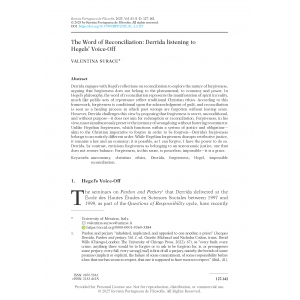Aubriot, Danièle. “Quelques rèflexions sur le pardon en Grèce ancienne.” Le Point theologique, no. 45 (1987): 21–28.
Austin, John Langshaw. How to do things with words. Cambridge: Harvard University Press, 1955.
Benjamin, Walter. “The Meaning of Time in the Moral Universe.” In Selected Writings, vol. 1 (1913-1926), edited by Marcus Bullock and Michael W. Jennings, 286–287. Cambridge, MA-London, England: Harvard University Press, 2002.
Butler, Judith. Excitable Speech: A Politics of the Performative. London-New York: Routledge, 1997.
Butler, Judith. Bodies that Matter: On the Discursive Limits of “Sex”. New York: Routledge, 1993.
Butler, Judith. “Rethinking Vulnerability and Resistance.” In Vulnerability in Resistance, edited by Judith Butler, Zeynep Gambetti, Leticia Sabsay, 12–27. Durham-London: Duke University Press, 2016.
Crépon, Marc. “Les langues du pardon (Note sur l’éthique hyperbolique).” In Le moraliste, la politique et l’histoire. De La Rouchefoucauld à Derrida, sous la direction de Jean-Charles Darmon, 226–38. Paris: Desjoinqueres, 2007.
Derrida, Jacques. Margins of Philosophy. Translated by Alan Bass. Brighton: The Harvester Press, 1982.
Derrida, Jacques. Glas. Translated by John P. Leavey Jr. and Richard Rand. Lincoln-London: University of Nebraska Press, 1986.
Derrida, Jacques e Labarrière, Pierre-Jean. Altérités. Paris: Osiris, 1986.
Derrida, Jacques. Limited Inc. Translated by Samuel Weber. Evanston, IL: Northwestern University Press, 1988.
Derrida, Jacques. Given Time: I. Counterfeit Money. Translated by Peggy Kamuf. Chicago-London: The University of Chicago Press, 1992.
Derrida, Jacques. Specters of Marx. The State of the Debt, the Work of Mourning and the New International. Translated by Peggy Kamuf. New York-London: Routledge, 1994.
Derrida, Jacques. “Le siècle et le pardon.” In Foi et savoir, suivi de Le siècle et le pardon, 101–33. Paris: le Seuil, 2000.
Derrida, Jacques. “On Forgiveness. A Roundtable Discussion moderated by R. Kearney.” In Questioning God, edited by John D. Caputo, Mark Dooley, Michael J. Scanlon, 52–72. Bloomington-Indianapolis: Indiana University Press, 2001.
Derrida, Jacques. “Faith and Knowledge: The Two Sources of ‘Religion’ at the Limits of Reason Alone.” In Acts of Religion, edited by Gil Anidjar, 40–101. New York-London: Routledge, 2002.
Derrida, Jacques. “Not Utopia, the Im-possible.” In Paper Machine. Translated by Rachel Bowlby, 121–135. Stanford, CA: Stanford University Press, 2005.
Derrida, Jacques. “Aphorism Countertime.” In Psyche: Invention of the Other, Volume II, edited by Peggy Kamuf and Elizabeth Rottenberg, 127–42. Stanford, CA: Stanford University Press, 2008.
Derrida, Jacques. “Avowing—The Impossible. ‘Returns,’ Repentance, and Reconciliation.” In Living Together. Jacques Derrida’s Communities of Violence and Peace. Translated by Gil Anidjar, edited by Elisabeth Weber, 18–41. New York: Fordham University Press, 2013.
Derrida, Jacques. The Death Penalty. Vol. I. Translated by Peggy Kamuf, edited by Geoffrey Bennington, Marc Crépon, and Thomas Dutoit. Chicago-London: The University of Chicago Press, 2014.
Derrida, Jacques. The Death Penalty. Vol. II. Translated by Elizabeth Rottenberg, edited by Geoffrey Bennington and Marc Crepon. Chicago-London: The University of Chicago Press, 2017.
Derrida, Jacques. Pardon and perjury. Vol. I. Translated by David Wills, edited by Ginette Michaud and Nicholas Cotton. Chicago-London: The University of Chicago Press, 2022.
Derrida, Jacques. Pardon and perjury. Vol. II. Translated by David Wills, edited by Ginette Michaud, Nicholas Cotton, and Rodrigo Therezo. Chicago-London: The University of Chicago Press, 2023.
Freud, Sigmund. “Jokes and their relation to the unconscious (1905).” In The standard edition of the complete psychological works, vol. 8. Translated by James Strachey, 9–238. London: The Hogarth Press, 1981.
Geraci, Silvia. “L’imperdonabile e il perdono.” In L’ultimo degli ebrei. Jacques Derrida e l’eredità di Abramo, 214–25. Milan-Udine Mimesis, 2010.
Hegel, Georg Wilhelm Friedrich. Philosophy of Mind (Encyclopedia of the Philosophical Sciences, Part III). Translated by William Wallace. London: Oxford University Press, 1894.
Hegel, Georg Wilhelm Friedrich. “The Spirit of Christianity and Its Fate.” In On Christianity. Early Theological Writings. Translated by T. M. Knox, 182–301. New York: Harper & Brothers, 1948.
Hegel, Georg Wilhelm Friedrich. Aesthetics. Lectures on Fine Art, vol. II. Translated by T. M. Knox. London: Oxford University Press, 1975.
Hegel, Georg Wilhelm Friedrich. Lectures on The Philosophy of World History. Introduction: reason in History. Translated by H. B. Nisbet. Cambridge-London-New York-New Rochelle-Melbourne-Sydney: Cambridge University Press, 1984.
Hegel, Georg Wilhelm Friedrich. Encyclopedia of the Philosophical Sciences in Basic Outline. Part I: Science of Logic. Translated and edited by Klaus Brinkmann and Daniel O. Dahlstrom. Cambridge-London-New York-New Rochelle-Melbourne-Sydney: Cambridge University Press, 2010.
Hegel, Georg Wilhelm Friedrich. The Phenomenology of Spirit. Translated and edited by Terry Pinkard. Cambridge-London-New York-New Rochelle-Melbourne-Sydney: Cambridge University Press, 2018.
Kant, Immanuel. “Religion within the boundaries of mere reason.” In Religion within the boundaries of mere reason and Other Writings. Translated and edited by Allen Wood and George Di Giovanni, 31–191. Cambridge-London-New York-New Rochelle-Melbourne-Sydney: Cambridge University Press, 1998.
Moroncini, Bruno. La lingua del perdono. Neapol: Filema, 2007.
Mulè, Paolo. “Una parola per l’impossibile. ‘Avvenire’ dell’evento etico in Jacques Derrida,” B@belonline 2, no. 7 (2006): 283–89.
Resta, Caterina. La passione dell’impossibile. Saggi su Jacques Derrida. Genova: il melangolo, 2016.
Surace, Valentina. “Immunità e auto-immunità: Roberto Esposito e Jacques Derrida in divergente accordo.” Shift. International Journal of Philosophical Studies, no. 1-2 (2020): 299–312.
Surace, Valentina. “Il mercante di Venezia. Jacques Derrida: il perdono al di là del potere.” In Margini. Saggi su Filosofia e Letteratura, 59–74. Milan-Udine: Mimesis, 2024.
Vergani, Mario. “Perdono segreto e perdono pubblico.” In Dal soggetto al nome proprio. Fenomenologia della condizione umana tra etica e politica, 97–123. Milan: Mondadori, 2007.









